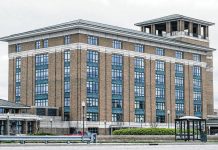As the city and Columbus Regional Health move forward with plans to transform FairOaks Mall into a wellness and recreation center called NexusPark, at least one city official is voting no.
The Columbus City Council voted 6-1 Tuesday to approve the first reading of appropriations for pre-construction costs, with Council President Pro Tem Elaine Hilber voting against the action. The appropriations were considered as an ordinance, which will require a second reading for final approval. The city council’s next meeting is June 15.
The city is seeking to appropriate $2.65 million from its general fund for pre-construction expenses with the NexusPark project.
Ferdon said the pending appropriations are for concurrent Phases 1A (the fieldhouse) and 1B (includes spaces for parks department administration, support and programming). The breakdown of the $2.65 million is as follows:
- Perkins and Will architect contract: $1,522,225
- Taylor Brothers Construction Co. construction manager contract: $685,700
- Estimated additional expenses: $442,075
Earlier on Tuesday, the Board of Works approved contracts for both the architect and project manager, contingent on city council approving the necessary funds. Both contracts are for Phases 1A and 1B, officials said.
During city council’s discussion of the appropriations, Hilber said she was concerned about how the city’s future use of Economic Development Income Tax funds to pay for part of the project might shift funding away from other projects or areas of need. She also expressed disappointment that renovations to Donner Center aren’t going to be an initial priority.
“I am in support of the project," she said. "I feel like I would love to see a project like this come to Columbus. I see the need, I understand. And I appreciate all of the work that everyone has done. I feel like the projections are conservative. I think that they were well done, really well done by the parks department. I just also feel that we do have community centers here in Columbus, right? We have The Commons mall. We have Donner. Those are also our community centers as well."
She continued, "Those are also assets that I feel like, have we been able to put in the dollars to maintain those to the level that we’re saying we’re going to be able to do on this building as well?”
She also expressed some concern about how long it could take NexusPark to become self-sustaining and what might happen if the city’s components were completed without the appropriate number of new staff ready to serve in those areas.
The project could be another financial hit to residents, Hilber said, particularly in light of the upcoming water and sewer rate increases, other city projects such as the riverfront, and increases outside of the city’s control (such as the school district’s referendum).
Jamie Brinegar, the city’s director of finance, operations and risk, said that using EDIT funds for NexusPark wouldn’t mean cutting other projects but would instead cause shifts in focus and funding.
Work on Donner can’t begin until Phase 1B of the NexusPark project — which includes administrative, programmable and support spaces for the parks department — is finished, he said.
“We can’t tear down Donner and have our parks staff with nowhere to go," Brinegar said. "So we’re delaying that just a little bit. It’s not being completely put off.”
Donner Center is about 78 years old and "can’t operate as a true community center" in its current state, said Mark Jones, parks director. In short, he said, it’s not right for what’s needed.
Jones said it is unlikely most of Donner Center will be torn down, but that it will turn into more of an aquatics destination.
Director of Administration and Community Development Mary Ferdon said that the city wouldn’t be able to manage third concurrent project, so they’re holding off on Donner.
"In choosing which ones, these two made the most sense, because we’ll get the parks administrative piece over into NexusPark and then we’ll actually have a better idea of what we’ll want left at the Donner Center," she said. "Right now, we don’t really know, because we haven’t moved it over yet.”
City officials also expressed confidence in the project’s economic viability, including Councilman Tom Dell who, like Hilber, is a Democrat. NexusPark will be an amenity for both residents and visitors, produce sufficient revenue and have an economic impact on the surrounding area, Dell said.
By providing funds for the architect and construction manager, the city will then be able to gain a "roadmap" for development, project costs and bonding, Dell said.
Councilwoman Grace Kestler, also a Democrat, voted in favor of the appropriations and stated her support for the project. However, like Hilber, she asked a number of questions about the project in regards to both funding and staffing.
“The $2.6 million — obviously we need that, I’m totally aware of that," she said. "It’s just a chunk of change to wrap your mind around for a project that we still have things to figure out on.”
In regards to staffing, city officials, including Brinegar, expressed confidence in the city’s ability to fund a few new positions in the short term early on.
Also, according to Ferdon, the concurrent development of the fieldhouse and parks administrative piece will have "limited impact on taxpayers."
Ferdon explained that for Phase 1A, the plan is to use a Local Income Tax Lease Purchase Bond, which will be paid for through EDIT funds. The EDIT bond will not impact property taxes at all, said Brinegar.
The city also plans to submit the project under the American Rescue Plan for an economic development grant.
For Phase 1B, the city plans to use parks property-tax-backed bonds, Series A, said Ferdon, and Series B will likely be reserved for Donner Center renovations. Taxpayers will see some impact on the parks’ piece of the project.
"We don’t know what that amount will be, but it’s actually quite miniscule," Ferdon added.
Brinegar also said that the city is doing "everything we can" to minimize the park bond’s impact on property taxes, which may not be seen until 2023 or 2024.
According to the ordinance, once the city sells bonds for the project, these funds will be reimbursed to the general fund.
In regards to the financial impact of other endeavors, the city’s riverfront and downtown mixed-use development projects are both funded by Tax Increment Financing, Brinegar noted.
A TIF district allows the city redevelopment commission to siphon off increasing property taxes in an area to fund improvements within that zone, essentially allowing development to pay for itself.
[sc:pullout-title pullout-title=”What’s next” ][sc:pullout-text-begin]
Ordinances require two readings for full approval; city council’s next meeting is scheduled for June 15.
The schedule now includes:
- June-Aug. — Schematic design
- Aug.-Oct. — Design development
- Fourth quarter of 2021: Construction documents finished.
- First quarter of 2022: Put the project out to bid and start construction by the end of this quarter (which should take about a year for both 1A and 1B).
- Mid to third quarter of 2023: Complete construction for Phases 1A and 1B.
Columbus Regional Health’s plans are somewhat concurrent with the city’s. CRH has their own architect for their portion of the space and plans to begin work around the same time of the city. They also plan to complete their first phase at about the same time as the city completes their first phase, said Brinegar.
According to a recent release, CRH’s Phase 1 will renovate about 50,000-square-feet of the health system’s total 125,000-square-feet allotment. The majority of services and programs in the facility will be based around preventative care or wellness.
CRH hopes to relocate some related services or practices into the space by mid-2022, with Phase 1 being completed by the end of 2023.
[sc:pullout-text-end][sc:pullout-title pullout-title=”About the project” ][sc:pullout-text-begin]
CRH and the city partnered in 2018 to purchase the FairOaks Mall facility and property at a 25% to 75% split, with the city retaining majority ownership for parks and recreation and sports tourism development. The Heritage Fund — The Community Foundation provided the difference between the selling price and the appraised value.
The purchase was driven by the idea of turning the mall into a community wellness, recreation and sports center, while also determining new potential uses for the Donner Center and connectivity with surrounding areas.
The mall project, newly-named NexusPark, was largely put on hold amid the COVID-19 pandemic, but planning and work has resumed as of late.
NexusPark is described as a “multi-use health, wellness and recreation campus."
The city stated in a release that the NexusPark campus will include:
- An indoor sports fieldhouse
- Columbus Parks administrative, activity and community spaces
- Retail
- Restaurants
- CRH medical and wellness offices
Columbus Parks Director Mark Jones said that part of the overall project will include changes to Donner Center and Donner Park. However, the initial phases do not include renovations to Donner Center, as work at the FairOaks mall site needs to be completed prior to those renovations.
[sc:pullout-text-end]




